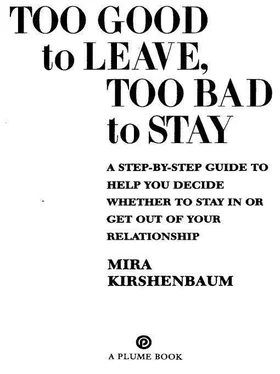Kirshenbaum, Mira - Too Good to Leave, Too Bad to Stay
Здесь есть возможность читать онлайн «Kirshenbaum, Mira - Too Good to Leave, Too Bad to Stay» весь текст электронной книги совершенно бесплатно (целиком полную версию без сокращений). В некоторых случаях можно слушать аудио, скачать через торрент в формате fb2 и присутствует краткое содержание. Жанр: Психология. Описание произведения, (предисловие) а так же отзывы посетителей доступны на портале библиотеки ЛибКат.
- Название:Too Good to Leave, Too Bad to Stay
- Автор:
- Жанр:
- Год:неизвестен
- ISBN:нет данных
- Рейтинг книги:3 / 5. Голосов: 1
-
Избранное:Добавить в избранное
- Отзывы:
-
Ваша оценка:
- 60
- 1
- 2
- 3
- 4
- 5
Too Good to Leave, Too Bad to Stay: краткое содержание, описание и аннотация
Предлагаем к чтению аннотацию, описание, краткое содержание или предисловие (зависит от того, что написал сам автор книги «Too Good to Leave, Too Bad to Stay»). Если вы не нашли необходимую информацию о книге — напишите в комментариях, мы постараемся отыскать её.
Too Good to Leave, Too Bad to Stay — читать онлайн бесплатно полную книгу (весь текст) целиком
Ниже представлен текст книги, разбитый по страницам. Система сохранения места последней прочитанной страницы, позволяет с удобством читать онлайн бесплатно книгу «Too Good to Leave, Too Bad to Stay», без необходимости каждый раз заново искать на чём Вы остановились. Поставьте закладку, и сможете в любой момент перейти на страницу, на которой закончили чтение.
Интервал:
Закладка:
Think about those words, it was nothing. They show how forgiveness works by saying that your crime isn’t so terrible. It’s not one of those unforgivable crimes. It’s a smaller, easier-to-forgive one. So if there was some doubt about just how big a crime stepping on your colleague’s foot was, or any other crime, the other’s ability to forgive you tells you exactly how big it was.
But where we run into huge difficulties in relationships is when someone does something to hurt and betray the other and forgiveness doesn’t flow easily and the sense of hurt and betrayal lingers. Anger, fear, and distance fester. That’s where you may be now. And what makes it all so confusing is that the two of you can’t agree about who’s responsible for this impasse.
Let’s say you’re the one who committed the “crime” against your partner. Is the inability in both of you to let this go a result of the terribleness of your crime? Or is it a result of the other person’s inability to forgive and forget?
Is your crime really so objectively terrible that anyone would have difficulty forgiving and forgetting (which may be what your partner’s been saying)? Or are you just an ordinary fallible human being who screwed up only to discover that your partner has some sick need to hold on to her grievances (which may be what you’ve been saying)?
Notice how you circle around each other here. The size of the crime determines the amount of forgiveness that’s necessary. But it’s circular: the amount of the forgiveness that comes across also measures the size of the crime.
For example, if you had an affair three years ago with someone from work, has your affair made the relationship too bad to stay in because having an affair really is such a terrible thing or is it because your partner’s having such a hard time forgiving the affair?
Let’s compare this to a physical injury. The size of the crime in your relationship is really the same as how damaging the injury is. The ease with which forgiveness comes is really the same as how much healing is possible.
That’s the way it is with any wound: the final effect is built out of some combination of damage and healing. If you’re trying to figure out whether you or your partner’s crime ultimately makes the relationship too bad to stay in, then you’ve got to determine the degree of damage and the possibility of healing.
STEP #28: THE WOUNDS THAT TIME CAN’T HEAL
How in the world can we actually determine how damaging is the thing that you or your partner did? It can be hard. A team of therapists would probably have trouble assessing the exact degree of damage. How can you do this, particularly from your vantage point inside the relationship where you spend half your time feeling hurt and angry about what happened and the other half trying to forget about it?
I’ve thought about this issue of damage assessment for a long time. So I want you to know that I know that I’m focusing on the absolute essentials about something that’s really very complicated. But I’m focusing in a way that’s helpful, without neglecting the impactful issues. That’s because I have the experience of a lot of people who’ve been in your situation to help me.
And if I listen carefully to them and to what they’ve said over a period of years, this is the question that comes up:
Diagnostic question #28. Whatever was done that caused hurt and betrayal, do you have the sense that the pain and damage has lessened with time?
Notice that this question doesn’t ask how bad a thing was done in the abstract. This isn’t a court of law. There’s no Book of Hurtful Deeds where you can look up some action and find it written whether it’s a relationship buster or not. In fact, even in ancient times the crime of adultery was only recognized if the hurt spouse wanted to make a big deal of it. In relationships, the meaning of “crimes” is always determined by what happens between the two partners and in their individual psychologies.
An Affair, for Example
I realize that question #28 might be hard to answer. To help you with it, let’s go through an example.
Suppose that the thing one of you did to cause hurt and betrayal was have an affair. Okay. I know there was a lot of anger and pain. I know that if this were a physical wound there’d be a lot of blood all over the place. But some wounds are very bloody and there’s not much real damage, and other wounds are fatal without much blood at all. So focusing on this affair we’re using as an example, whenever it happened, a year ago or ten years ago, the question is: is the sense of grievance less now than it was when you or your partner first found out about it?
Time Makes a Difference. Of course, healing depends on how long ago an affair happened.
If the affair was only, say, a year ago, that’s not a lot of time in relationship years and it’s certainly possible that not a lot of cooling off will have happened. So, in this example, if the affair has only been a problem between you for a year, then you’ve got to look closely to see if there’s been a slight lessening of the sense of grievance. After only a year, a slight lessening is all you need to be able to say that the damage can be healed. What you have to avoid is being misled by how little cooling off there’s been into thinking there’s been no cooling off.
But suppose that the affair has been an issue between you and your partner for, say, ten years now. Now time can be confusing in a different way. The everyday details of life and the inevitable changes in your living patterns can make it seem as though you’re going for weeks without a hint of the memory of the affair. Denial is easy and attractive. And yet, in some cases, if there’s the slightest tension or irritation between you, the affair can still leap out of the box you’ve put it in as fresh as if it had just happened yesterday. What you have to avoid here is being misled by how seldom the issue of the affair comes up into thinking there’s been any cooling off at all.
In other words, when one person in a relationship does something to cause a lot of hurt and anger, there are two completely opposite kinds of reactions that even after all my years of clinical work still impress me:
1. The utter violence and craziness of people’s responses (particularly in the short run)
2. People’s total capacity for complete denial or avoidance (particularly in the long run)
Keeping this in mind, here’s the guideline. But let me point out that there’s some explanation following the guideline you must pay attention to.
GUIDELINE #28
If, according to the following timetable, there continues to be a lessening in the sense of pain and hurt and fear and anger after the “crime” you or your partner committed, then there’s a good chance that your relationship can heal the damage caused by this “crime.” In that case, if this was the main reason you were thinking of leaving the relationship, the odds are in your favor that it’s too good to leave. Quick take: Time heals all healable wounds.
Here’s the timetable for measuring whether there’s been a healing of the damage:
• The first month. Any slight hint of cooling off at all in the first month is a good sign. This could include moments when you can talk about something other than the “crime” without tears or anger, even though you’re still guarded. It could even include an inner feeling of hope that the two of you can get beyond this. The avoidance of hysterical, acting-out reactions that actually make things worse is another good sign.
• After the first month. Any small or temporary reestablishment of your prior relationship is a good sign, combined with the ability to take the first steps toward dealing productively with what happened. Some examples of healing to look for after the first month are that you begin to talk for several minutes about what happened before you get upset again; you find yourself falling into your old intimacy patterns for a day or so at a time; you begin to entertain the possibility of one day trusting each other again; there’s simply less emotional pain coming up spontaneously with the thought of what happened.
Читать дальшеИнтервал:
Закладка:
Похожие книги на «Too Good to Leave, Too Bad to Stay»
Представляем Вашему вниманию похожие книги на «Too Good to Leave, Too Bad to Stay» списком для выбора. Мы отобрали схожую по названию и смыслу литературу в надежде предоставить читателям больше вариантов отыскать новые, интересные, ещё непрочитанные произведения.
Обсуждение, отзывы о книге «Too Good to Leave, Too Bad to Stay» и просто собственные мнения читателей. Оставьте ваши комментарии, напишите, что Вы думаете о произведении, его смысле или главных героях. Укажите что конкретно понравилось, а что нет, и почему Вы так считаете.












